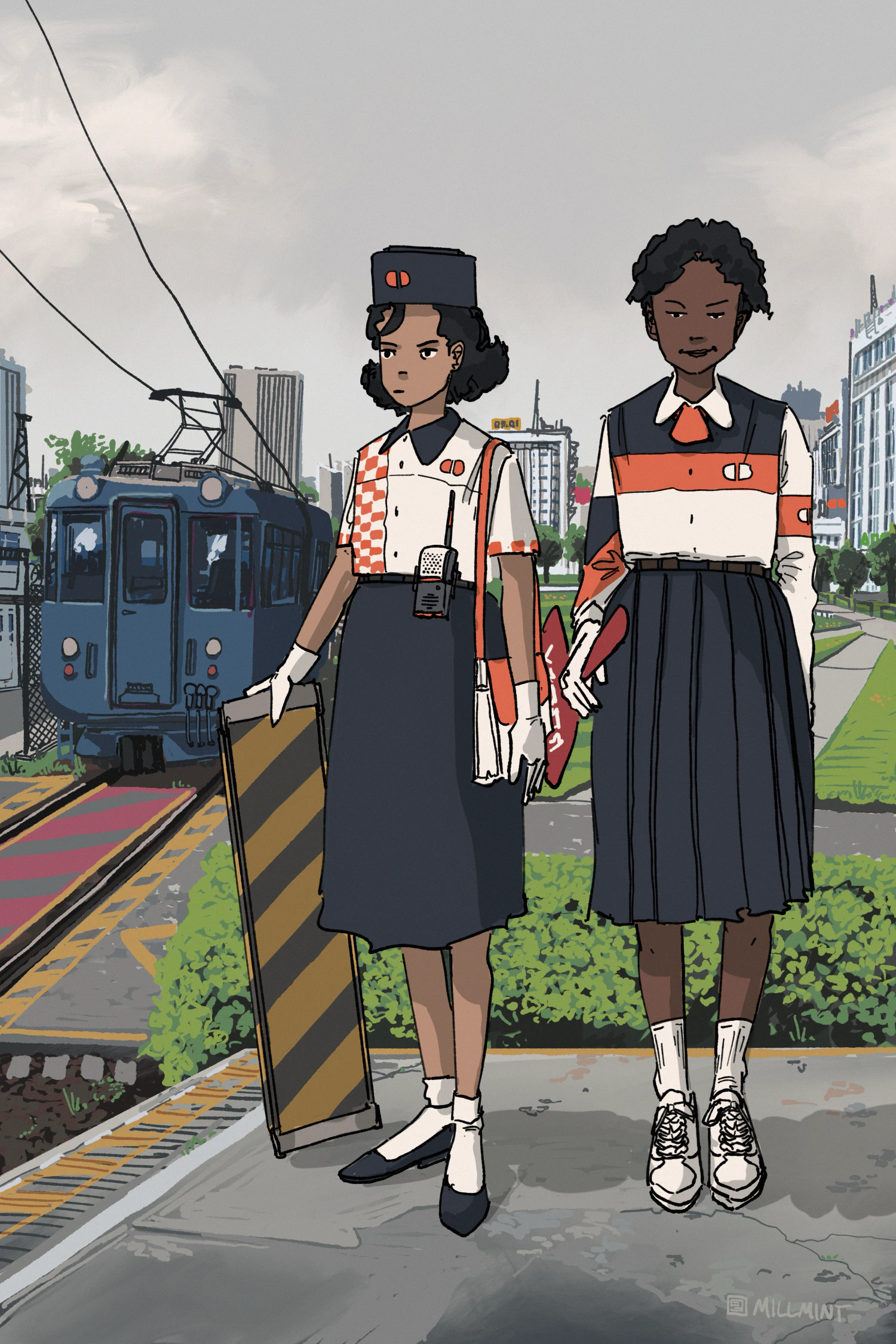NEW Story: Sunday Morning
Station girls

Tzipora the Platform Attendant #
Tzipora was a train enthusiast – of course she was, you somehow knew that looking at her. She was a member of the Vekllei Rail Association, and worked a couple days a month as a platform attendant. It was part hobby and part job. She had training in first aid and disability services, and so she helped Commonwealth National Rail – she rode the trains around giving timetable advice and assisting disabled passengers board and alight trains.
She had been shilling the Rail Association to her friends, but none of them shared her enthusiasm for train travel. The exception was Coretti, who joined because she was dating Tzipora’s friend, Moise, and was trying to know her better. They were employed by CNR in an unusual legal framework as “associate employees,” or volunteers. These jobs are common in Vekllei, where work is play and volunteerism is beat into them.
Uniform Notes #
Commonwealth National Rail employs nearly 40,000 people and has many uniforms. Both Tzipora and Coretti wear white gloves, which is a recent addition. You are supposed to wear them if you are going to touch people, since there are now many immigrants in Vekllei and not all of them are as comfortable as Oslolans being touched or pushed by service staff.
Both Coretti and Tzipora are wearing their ordinary shoes and school skirts. The practical colours of their school uniform allow a single navy skirt, white shirt or pair of leather shoes to be useful in many different roles in society, reducing waste.
Civic Associations in Vekllei #
Three types of civic association exist in Vekllei.
- Labour Syndicates: organised labour in enterprises that are not democratised. Most commonly, these apply to small and medium-sized businesses.
- Policy Advocates: special-interest policy groups that are expressly political.
- Councils: organised associations of people with something in common.
What all have them in common is that they are organised; they have a leadership structure, and keep records. Similar organisations exist in many other countries, but Commonwealth councils are unique in their ubiquity and power in society. Their interests range from Polish cultural groups to academic associations and, indeed, railroad employees and enthusiasts.
It is important to remember that work is primarily social in Vekllei and consequently it does not occupy the same role in people’s lives. Few Vekllei jobs simply “clock in, clock out.” Instead, there is a vast sea of semi-professionalised labour that exists somewhere between employment and hobbyism. It is in this context that councils proliferate, and force a reconsideration of how we think about work.
Large companies have large associate councils. These are not integrated directly – they exist voluntarily, as congregations of enthusiasts. Commonwealth Airways has several associate councils with which it engages and does business, including the Student Pilots Association No. 1184, Commonwealth Air Enthusiasts No. 622, Atlantic Model Aeroplane Association No. 646, Air Doctors Social Club No. 801, Women in Flight No. 340, and many others.
Councils are a means to engage with customers, provide employees with social and recreational opportunities, and solicit ideas and labour from enthusiasts. Consequently, there are millions of Vekllei people who have semi-professional gigs on the side. These councils, in turn, provide avenues for employment and a means to socialise with like-minded people. They also contribute representatives to the civic ecclesia1 of a local area, and thus advise local government. They are often fickle, schismatic, and poorly organised – but they’re social organisations, and are afforded those shortcomings.
Other types of council might represent Islamic interests in a city, or Lithuanian culture. Others organise amateur bakers. Their diversity allows for a kind of organising not represented by labour unions or political associations, and validate a variety of interests in the function of democratic government.
-
A civic ecclesia is an advisory body of citizens in a local administration. It consists of notable citizens in good standing, cultural groups and representatives from Councils. ↩︎

